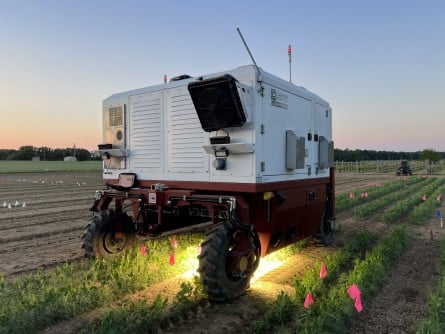A groundbreaking approach to weed control is taking shape in New Jersey, where scientist Thierry Besançon from Rutgers University is testing a tractor-sized machine that employs lasers to eliminate unwanted plants. This innovative technology, which uses artificial intelligence to distinguish between crops and weeds, aims to provide an eco-friendly alternative to traditional herbicides.
Besançon, an associate professor in the Department of Plant Biology, recently led field trials of this high-tech device, which has the potential to revolutionize weed management. “It’s pure physics,” he stated. “There’s no herbicide involved. It’s just light energy targeting the weeds.” The findings, published in the journal Pest Management Science, mark the first peer-reviewed study of artificial intelligence-guided laser weeding on the East Coast.
Promising Results from Field Trials
The early results from these trials are encouraging. The laser weeder demonstrated effectiveness comparable to conventional herbicides, and in some instances, it even contributed to enhanced crop growth. The research took place at the Rutgers Agricultural Research and Extension Center in Upper Deerfield, a vital site for vegetable crop studies in the state. The trials involved crops such as spinach, peas, and beets, highlighting the technology’s relevance for New Jersey’s small farms and specialty crops where herbicide options are limited.
Researchers employed a demonstration unit from Carbon Robotics, a company known for pioneering this laser technology. The machine is equipped with high-resolution cameras and deep learning algorithms that allow it to differentiate between crops and weeds in real-time. During the tests conducted in spring and summer of 2024, the device effectively targeted weeds with precision, even in close proximity to desirable plants.
Dr. Lynn Sosnoskie from Cornell University collaborated on the project, reinforcing the significance of this research. In an editorial published in Pest Management Science, Stephen O. Duke, a prominent weed scientist from the University of Mississippi, described the findings as “potentially transformative.” He noted that the study offers compelling evidence that artificial intelligence-guided lasers could soon change how weeds are managed in agricultural practices.
Challenges and Future Prospects
While the technology shows great promise, challenges remain. The cost of the laser weeder begins at approximately $500,000, which may limit accessibility for some farmers. Additionally, the machine is not fully autonomous and requires skilled operators to ensure optimal performance. “We had weeds growing just half a centimeter from the crop seedlings,” Besançon noted. “And there was no laser damage to the crops. It’s extremely precise.”
One grower who specializes in herbs expressed interest in acquiring a commercial version of the laser weeder, citing a lack of chemical solutions for his crops. “He told me, ‘I don’t have any other options,’” Besançon recounted. This highlights the urgent need for effective weed management solutions in regions where traditional herbicides are not viable.
Although the machine excels in controlling smaller weeds and requires multiple passes during the growing season, Besançon remains optimistic about its future. “They’re already working on faster, more efficient versions,” he said, suggesting that operational speeds may one day reach five miles per hour instead of the current one or two.
The advantages of this laser technology are significant. By eliminating the need for herbicides, it minimizes chemical exposure for workers, consumers, and the environment. Furthermore, it addresses the increasing issue of herbicide-resistant weeds, such as Palmer amaranth, which have become a growing concern in New Jersey and New York.
Besançon emphasized the innovative nature of this approach, stating, “With this, we are using photons for weed control. It’s not just a new tool – it’s a new way of thinking about how we manage weeds.” As the technology advances and becomes more affordable, it holds the potential to transform weed management practices, particularly for organic and specialty crop growers.
The utilization of AI-guided machines equipped with laser technology is already gaining traction among farmers on the West Coast as an eco-friendly alternative to herbicides. Besançon sees significant opportunities for farmers across the East Coast and beyond to adopt laser weeders as a sustainable method of safeguarding the environment. “We’re talking about our food supply,” he said. “We need to grow vegetables like peas, beets and spinach, and we need better ways to control weeds without harming the crops or the planet.”
Reflecting on his work with lasers in agricultural settings, Besançon admitted, “Ten years ago, I would not have believed it. But here we are. It’s exciting, and it’s just the beginning.” Wesley Bouchelle, a technician at the New Jersey Agricultural Experiment Station’s Philip E. Marucci Center for Blueberry & Cranberry Research, also contributed to the study, highlighting the collaborative efforts in advancing agricultural innovation.







